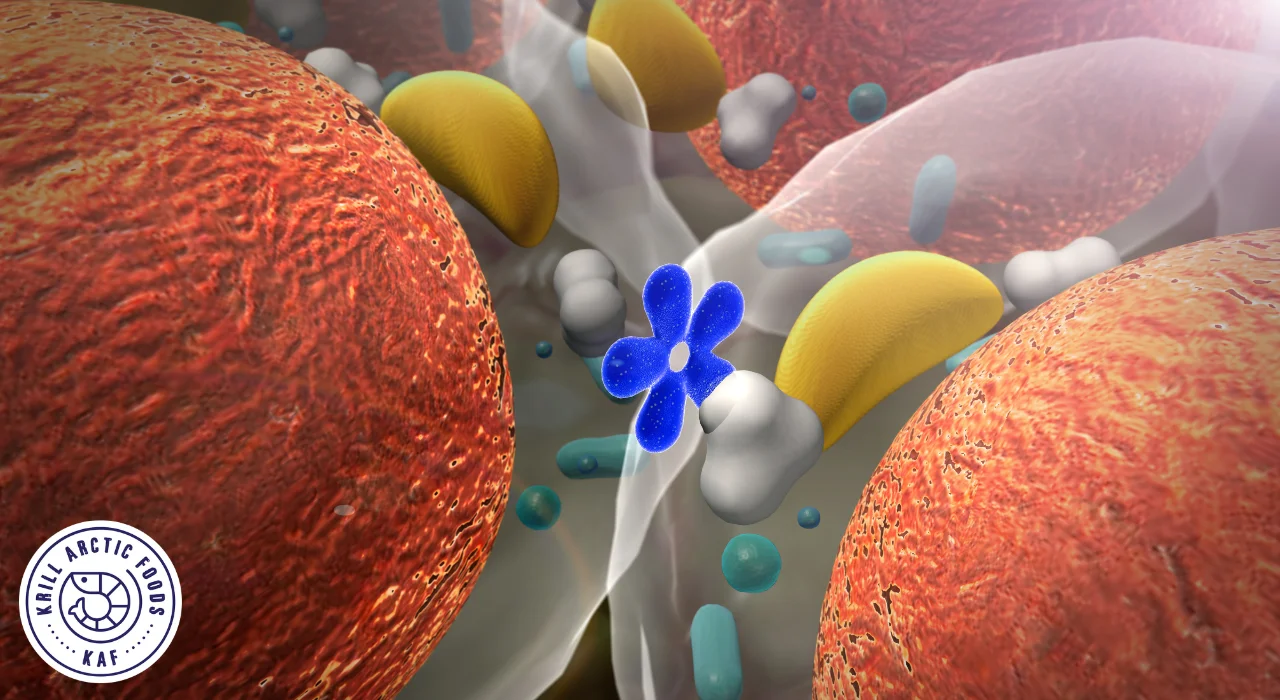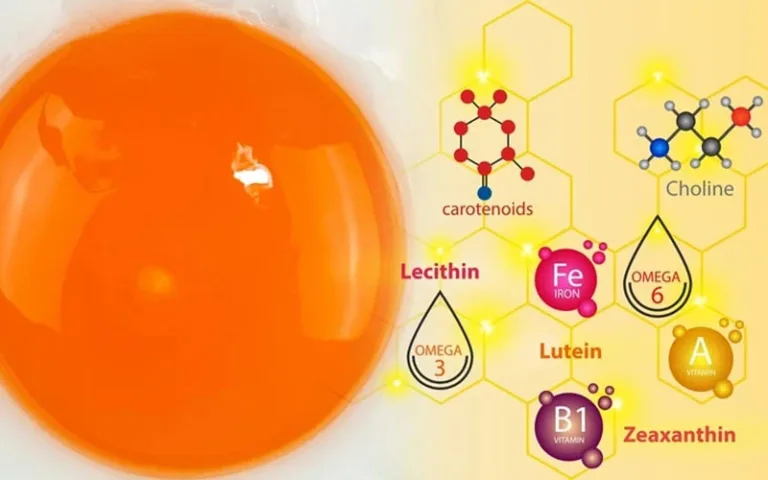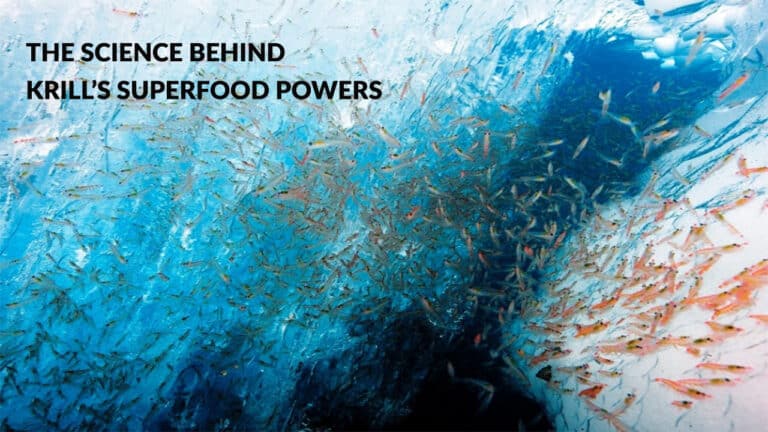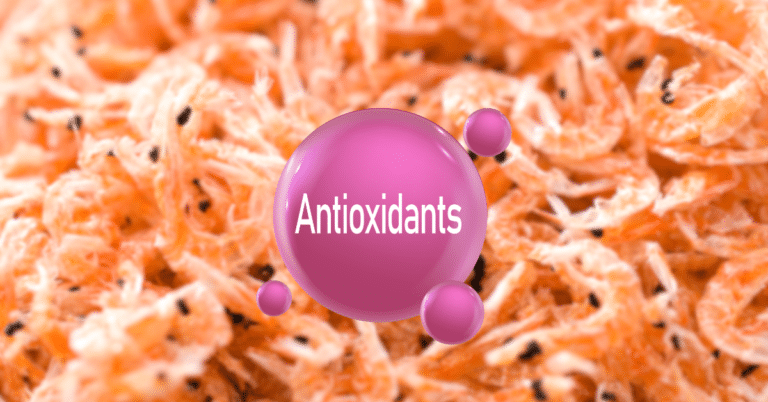Protein for Hormonal balance is key to feeling your best whether that means staying energized, managing stress, or stabilizing your mood. But here’s the catch: no matter how clean your diet is or how well you sleep, if your protein intake isn’t right, your hormones might still be off. Protein does more than just build muscle; it plays a big role in keeping your hormones in check.
Think of your hormones as workers, and protein as the tool they need to do their job. Without enough protein, these workers struggle, which can lead to fatigue, mood swings, weight gain, and even irregular cycles.
If you’ve been feeling out of balance and don’t know why, protein might be the missing piece. Let’s dive into why protein matters for hormonal health and how to make sure you’re getting the right amount without overcomplicating things.
Why Protein Matters for Hormonal Health
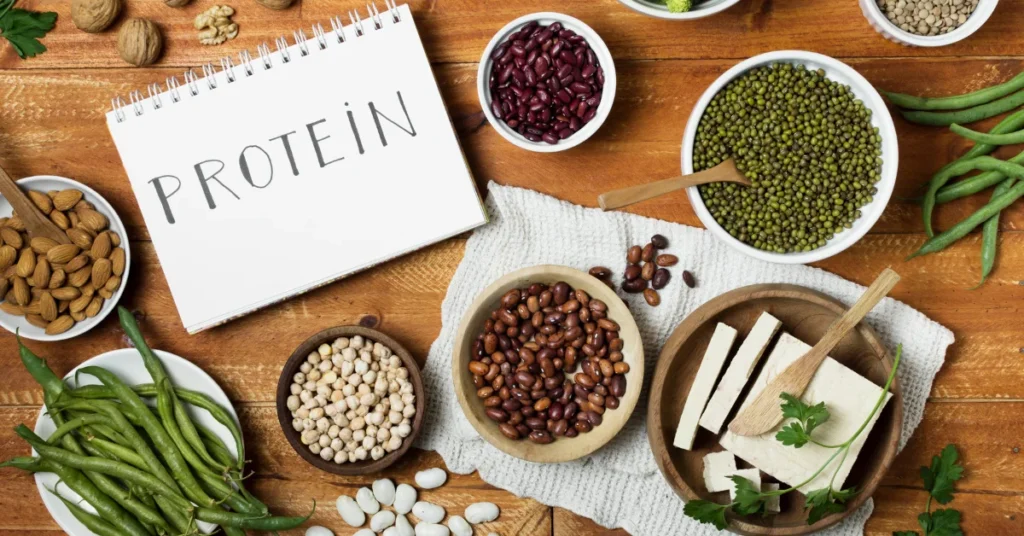
Your body needs amino acids (from protein) to create most of your hormones insulin, cortisol, estrogen, testosterone, thyroid hormones, and more. Without enough high-quality protein, your system gets thrown off. No amino acids, no hormones.
When you’re short on protein, you might notice:
- Brain fog and fatigue
- Weight gain (especially around the middle)
- Irregular periods or worsened PMS
- Mood swings, anxiety, or low motivation
- Sugar cravings and poor sleep
- Slow recovery or hair thinning
Sound familiar? Fixing this starts with eating the right kind of protein.
Types of Protein for Hormonal Health
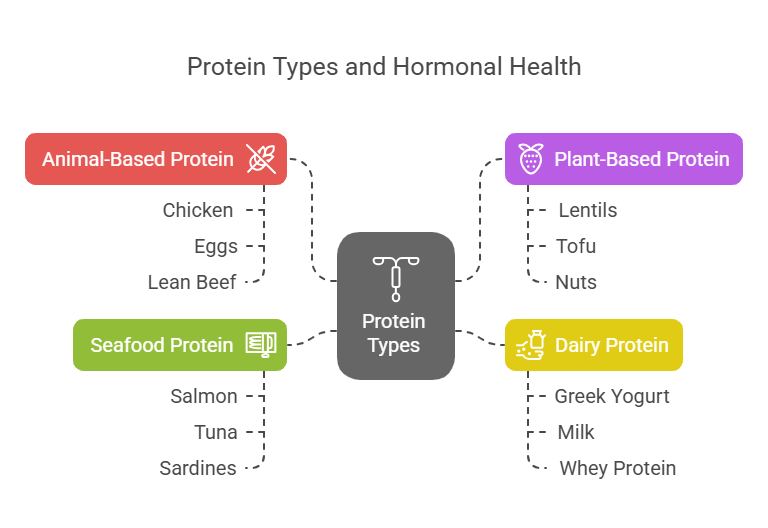
Hormonal balance isn’t just about what you avoid like sugar or stress but also about what you nourish your body with. Protein is one of the most critical nutrients your body needs to build and regulate hormones. Here’s a deeper look at the four primary categories of protein and how each contributes to hormonal well-being.
Animal-Based Protein
Sources:
Chicken, turkey, lean beef, lamb, eggs, organ meats (like liver), bone broth
How it supports hormonal health:
Animal protein is considered “complete”, meaning it contains all nine essential amino acids required for hormone production. It’s especially rich in:
- Iron & B12: Crucial for energy production and thyroid function
- Zinc: Needed for testosterone and immune hormone balance
- Saturated fats (in moderation): Support sex hormone production, including estrogen, progesterone, and testosterone
- Choline (found in eggs): Helps with estrogen metabolism and liver detox
Best for:
- Supporting sex hormones (estrogen, testosterone, progesterone)
- Women in perimenopause or those with heavy periods (due to higher iron needs)
Plant-Based Protein
Sources:
Lentils, chickpeas, black beans, tofu, tempeh, edamame, quinoa, nuts, seeds, spirulina
How it supports hormonal health:While plant proteins are often “incomplete” (lacking one or more essential amino acids), eating a variety throughout the day ensures you get what you need. Plant proteins also provide:
- Phytoestrogens (especially from soy): Natural compounds that can help balance estrogen levels, particularly during menopause or estrogen dominance
- Fiber: Helps with detoxification of excess hormones and stabilizing blood sugar
- Magnesium & antioxidants: Support adrenal function and stress resilience
Best for:
- Women with estrogen dominance, PCOS, or PMS symptoms
- Improving insulin sensitivity
- Gut health and hormone detox
Dairy Protein
Sources:
Greek yogurt, kefir, cottage cheese, milk, whey protein, casein protein
How it supports hormonal health:
Dairy proteins offer both fast-digesting (whey) and slow-digesting (casein) proteins, along with key micronutrients:
- Calcium & Vitamin D: Help regulate parathyroid hormone and support estrogen function
- Tryptophan: An amino acid that boosts serotonin (which stabilizes mood and sleep)
- Probiotics (in fermented dairy): Improve gut health, which is linked to estrogen metabolism and cortisol control
Best for:
- Mood-related hormone support (serotonin, melatonin)
- Bone and reproductive health
Seafood Protein The Hormone Powerhouse
Sources:
Salmon, tuna, sardines, mackerel, trout, shrimp, krill, oysters
Packed with omega-3 fatty acids, selenium, iodine, and highly bioavailable amino acids seafood is in a league of its own when it comes to balancing hormones naturally and efficiently.
Why Seafood Is the Smarter Protein for Hormonal Balance
Seafood is packed with nutrients your hormones thrive on, making it an excellent protein source. Here’s why it stands out:
- Complete Protein: Contains all nine essential amino acids needed for hormone regulation.
- Easily Digestible: Light on the gut, helping with better nutrient absorption and less digestive stress.
- Low in Saturated Fat: Helps reduce inflammation, which can disrupt hormone function.
- Rich in Omega-3 Fatty Acids: Supports healthy estrogen, testosterone, and cortisol levels, improving mood and metabolism.
- High in Iodine & Selenium: Essential for thyroid function, which regulates energy and metabolism.
- Provides Choline & Vitamin B12: Supports brain health, energy, and proper estrogen metabolism.
Best 7 Seafood Proteins for Hormonal Balance
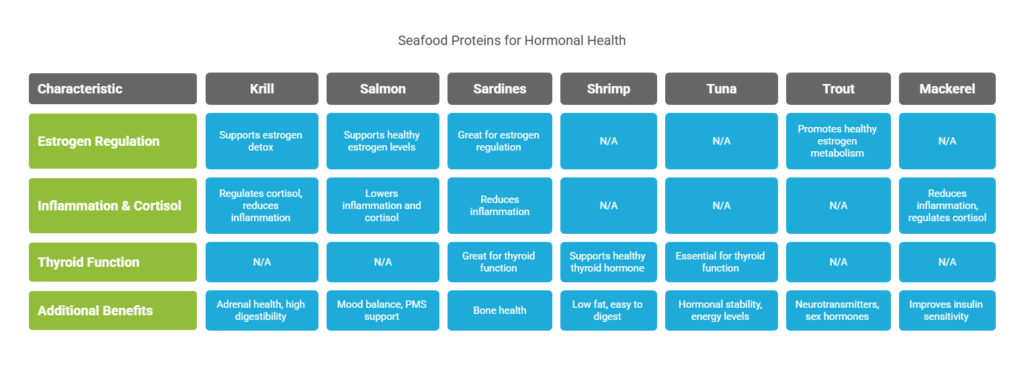
Here’s a quick look at some of the best seafood protein sources to support hormonal health:
Krill Meat
Krill is packed with choline, which helps detox estrogen and supports liver function. Its omega-3s regulate cortisol levels and reduce inflammation, while the antioxidant astaxanthin aids in adrenal health and recovery. With up to 97% digestibility, krill is a highly efficient protein for your body.
Salmon
Rich in omega-3 fatty acids, salmon helps lower inflammation and cortisol levels, while vitamin D supports healthy estrogen and testosterone levels. It also regulates serotonin, making it an excellent choice for mood balance and PMS support.
Sardines
Loaded with vitamin D, calcium, selenium, and omega-3s, sardines are great for thyroid function, bone health, and estrogen regulation. They’re particularly beneficial for women in their 30s and beyond, supporting overall hormonal health.
Shrimp
High in iodine, shrimp supports healthy thyroid hormone production. It’s low in fat and easy to digest, making it ideal for people with stress-related hormone imbalances or sluggish metabolism.
Tuna
Tuna provides selenium and vitamin B12, which are essential for thyroid function and hormonal stability. It also helps maintain balanced insulin and energy levels, supporting overall metabolic health.
Trout
Rich in B vitamins, especially B6 and B12, trout supports the production of neurotransmitters and sex hormones. It helps maintain energy stability and promotes healthy estrogen metabolism.
Mackerel
High in omega-3s and CoQ10, mackerel helps reduce inflammation, regulate cortisol levels, and improve insulin sensitivity. It’s especially useful for managing stress-related hormone imbalances and conditions like PCOS.
Conclusion: Balance Starts with Protein
Hormonal balance is key to feeling your best, but if your protein intake is off, your hormones may still be out of sync. Protein is essential for hormone regulation, not just muscle-building.
Without enough protein, your hormones can’t function properly, leading to issues like low energy, mood swings, and irregular cycles. Seafood is an excellent source of protein, providing the nutrients your body needs to restore balance.
By adding more seafood like krill, salmon, and sardines to your meals, you’ll support better hormonal health and feel more balanced. Start with the right protein, and your hormones will thank you.

